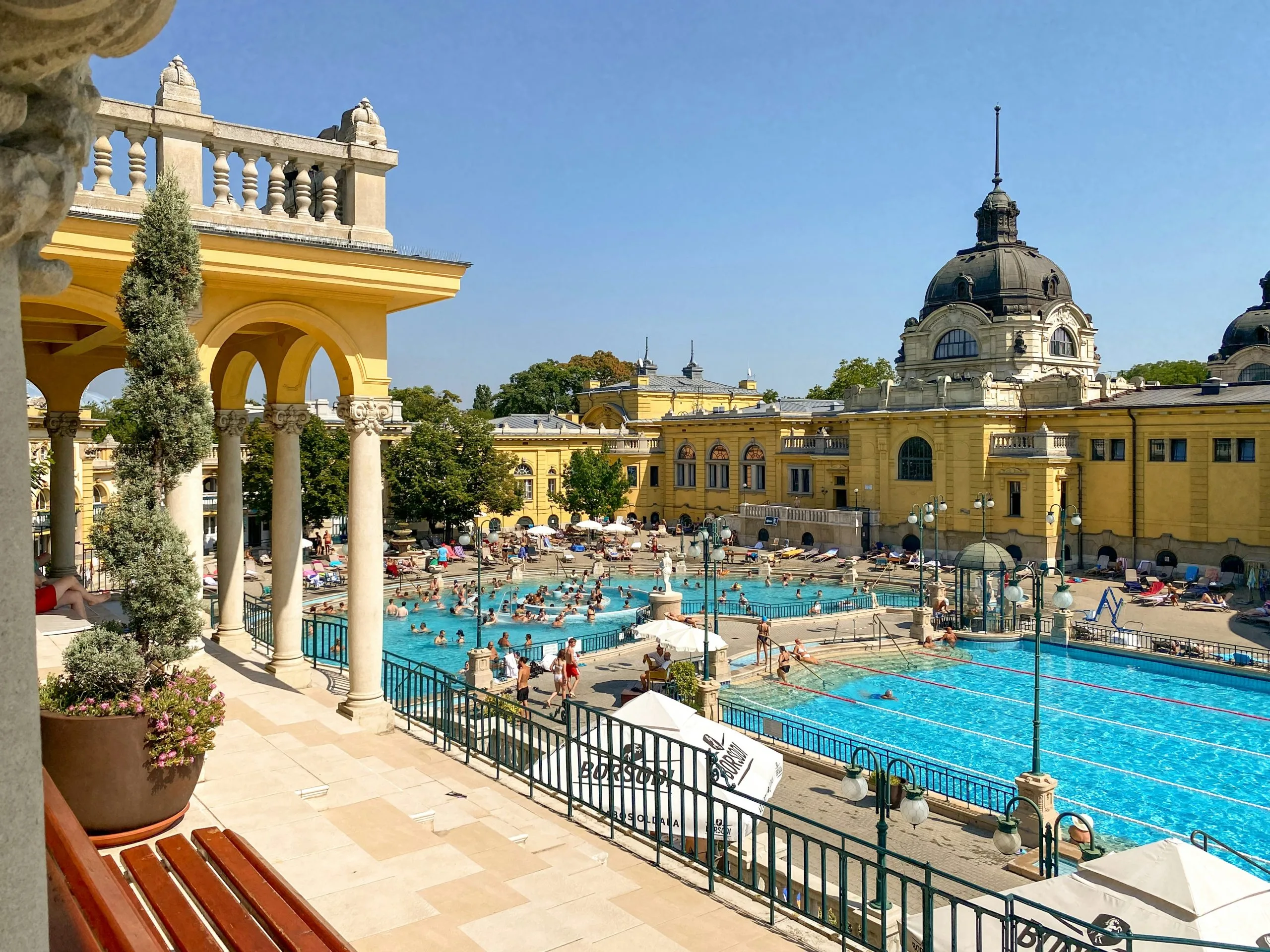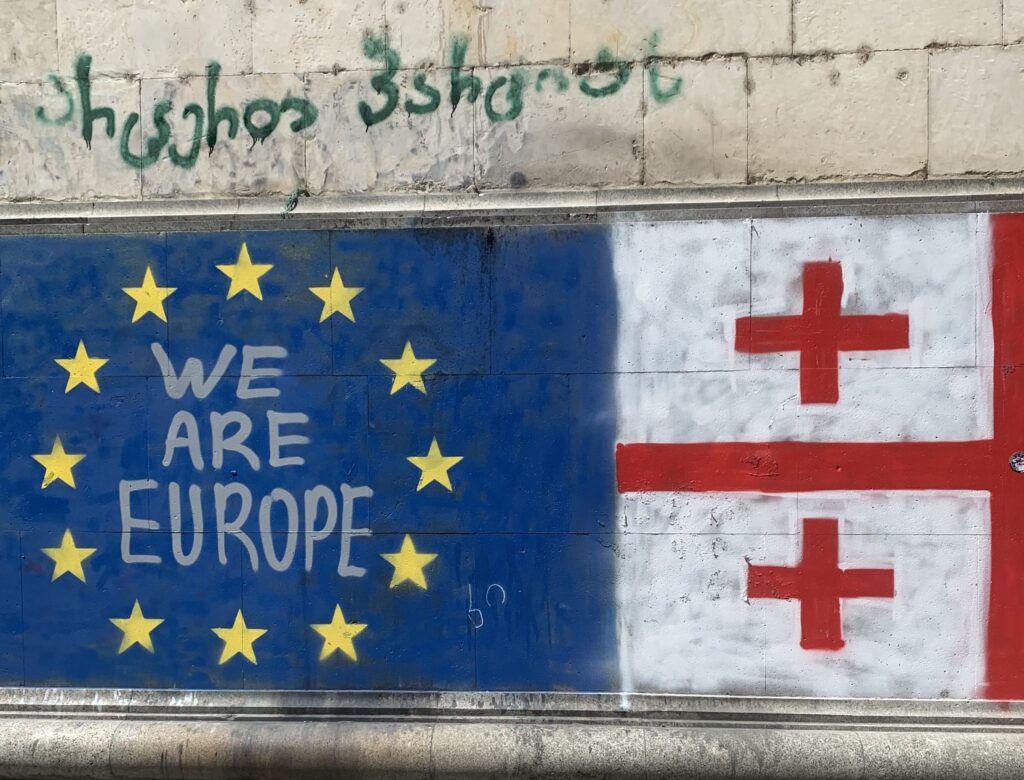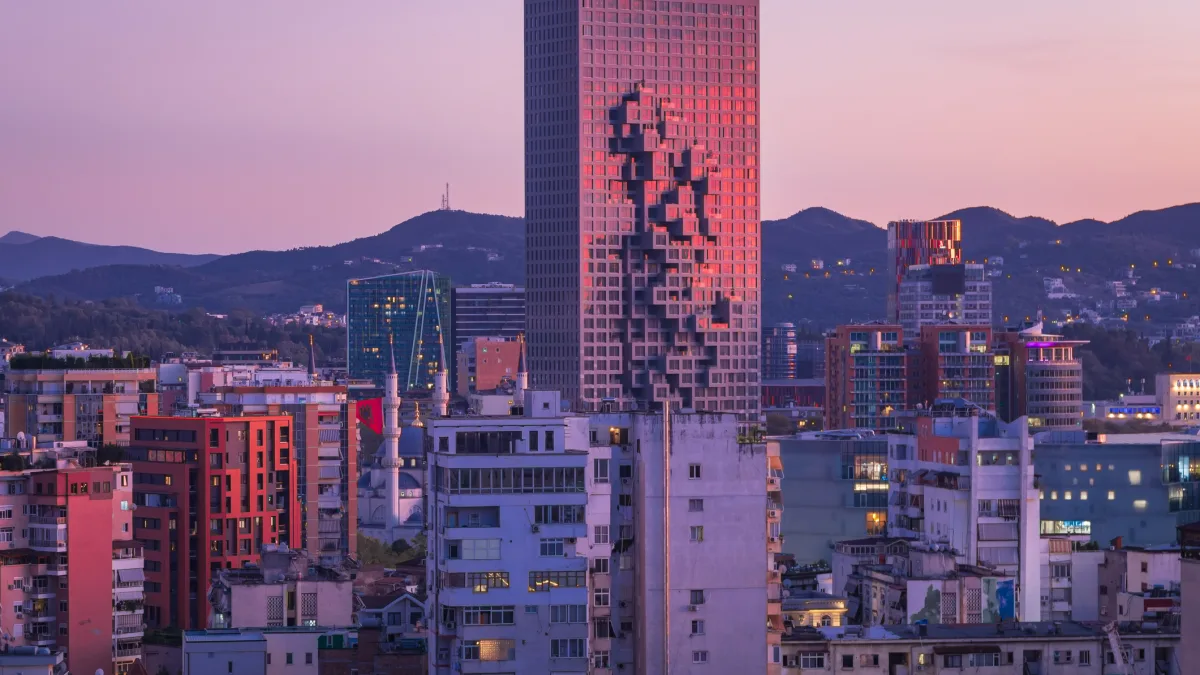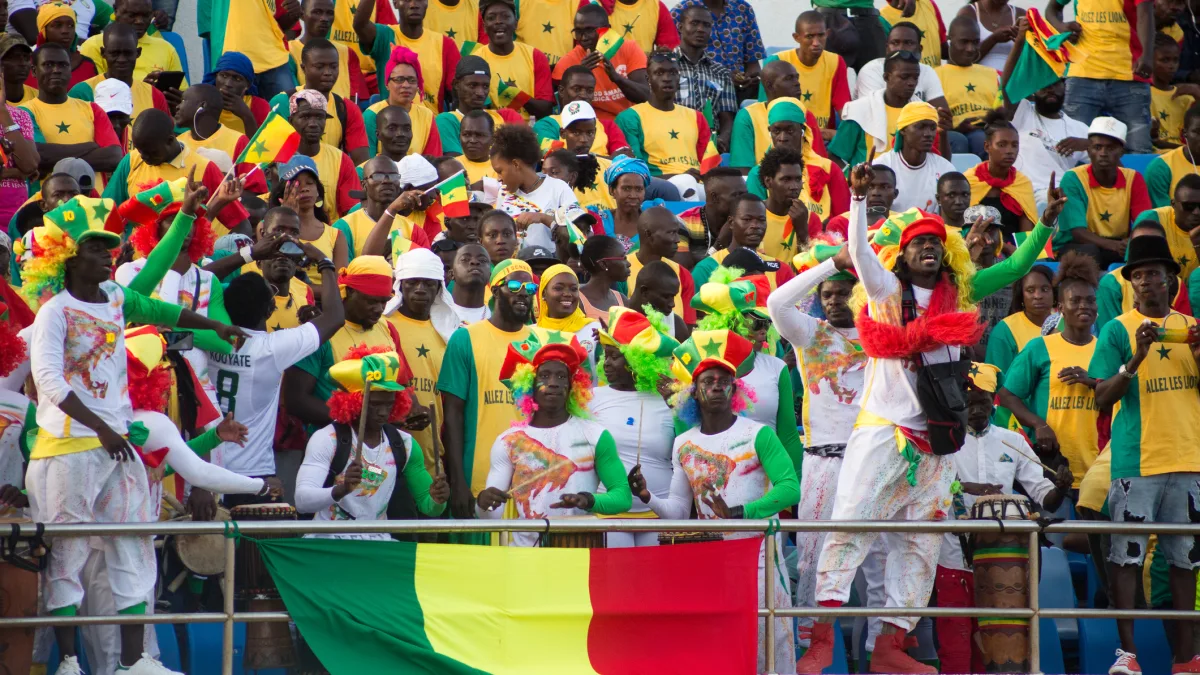Graffiti on the wall of Georgia’s parliament building makes it clear what many residents of the country’s capital, Tbilisi, now think of their ruling party, Georgian Dream.
F*ck Russian Dream, it reads. EU flags and proclamations that We Are Europe meanwhile abound. Posters declare that, “today, 84 MPs sold my country to Russia”.
A law widely viewed by its opponents as a deliberate attempt to sabotage the country’s EU accession process passed its third and final reading in Georgia’s parliament on May 14, despite the presence of hundreds of thousands of protesters outside the parliament building.
The legislation, officially the Law on Transparency of Foreign Influence, is nearly identical to a draft law the Georgian parliament tried to adopt in 2023 but withdrew following similar mass protests. In the new version, Georgian Dream substituted the term “agents of foreign influence” with “organisations serving the interests of a foreign power”. This time, the government has not backed down. But neither have those protesting against it: often despite Tbilisi’s infamous May downpours.
“We have nothing to lose anymore,” one student protester told me. “It’s Europe or Russia. It’s never been so easy to pick a side. We will be here until it ends, until they back down or they crack down.”
The bill’s many opponents within Georgia have dubbed it ‘the Russian law’ given its similarity to legislation in Georgia’s northern neighbour, which continues to occupy some 20 per cent of Georgian territory. Many fear that the law is a further step towards realigning Georgian foreign policy with Moscow.
It requires nongovernmental groups and print, online, and broadcast media that receive 20 per cent or more of their annual revenue—either financial support or in-kind contributions—from a “foreign power” to register with the Ministry of Justice as “organisations serving the interest of a foreign power”.
Some NGOs, including Transparency, have declared that they have no intention of registering.
‘If you receive money from the West then you are an enemy’
Doing so, they say, means complying with onerous, duplicative reporting requirements, inspections, and administrative liability, including heavy fines for violations. Individuals can also be targeted. But as grim as the law is, its meaning is far deeper, suggests Marika Mikiashvili of Droa—a civil society movement that has now become a political party.
“What the law does is equate any organisation receiving foreign money as an enemy,” she says. “A ‘foreign agent’ in Georgian means ‘spy’. So NGOs are portrayed as spies, enemies.”
Bidzina Ivanishvili, a former Georgian prime minister, the founder of Georgian Dream and the country’s richest person (his fortune—made in Russia in the 1990s—is said to be the equivalent of one third of Georgia’s GDP), earlier this month defended the law by claiming that ‘the West’ itself was an “external adversary” of Georgia and that Georgia’s civil society was an “internal enemy”.
“[Western powers and NGOs] are plotting to overthrow the government and want to open a second front [with Russia] in Georgia,” he said.
As such, “If you receive money from the West then you are an enemy because the West is the enemy,” adds Mikiashvili. “That’s what the law means.”
Europe, not Russia
What becomes immediately apparent to anyone who has followed protest movements in Georgia before is just how young the current crop of demonstrators is. The vast majority are under 30, many much younger. I spoke to high school students who said that they had no choice but to fight for their future. “We don’t want Russia to take it from us,” said one.
“The thousands of people on the streets are not just defending a few NGOs or a few media outlets. This is a fight for Georgia’s European future,” says Ketevan Chachava, a non-resident fellow with the Democratic Resilience Programme at the Centre for European Policy Analysis (CEPA).
Creeping Russian influence is visible throughout Georgia—and not just the tens, possibly of hundreds of thousands of Russians who fled their home country in 2022 to avoid the military draft or economic sanctions.
Worryingly, while many of Russia’s neighbours are diversifying energy supplies away from Moscow, Georgia is heading in the opposite direction. Imports of natural gas from Russia increased by 15 per cent in 2023, while the share of Russian natural gas in Georgia’s internal consumption reached 20 per cent—up from 17.3 per cent in 2022 and 16 per cent in 2021.
Furthermore, while broadly condemning Russia’s invasion of Ukraine in both 2014 and 2022, Georgian Dream has refused to join international sanctions against Moscow. Similarly, it has preferred to ignore the issue of the occupied Abkhazia and Tskhinvali regions.
Despite protests, in 2023 Georgian Dream allowed Russian airlines to recommence flights between the two countries—flights had been banned unilaterally by Moscow in 2019 following violent protests against the visit of a Russian politician to Tbilisi.
The first flights from Moscow to arrive in Tbilisi after the lifting of the ban were met by waves of demonstrators, as were Russian cruise ships when they docked on the Georgian coast last summer.
An amendment to Georgia’s tax code passed by parliament last month will meanwhile make it easier and cheaper for people to transfer their assets to Georgia. “These changes will increase the risk of inflow of criminal and Russian capital into Georgia,” says Transparency.
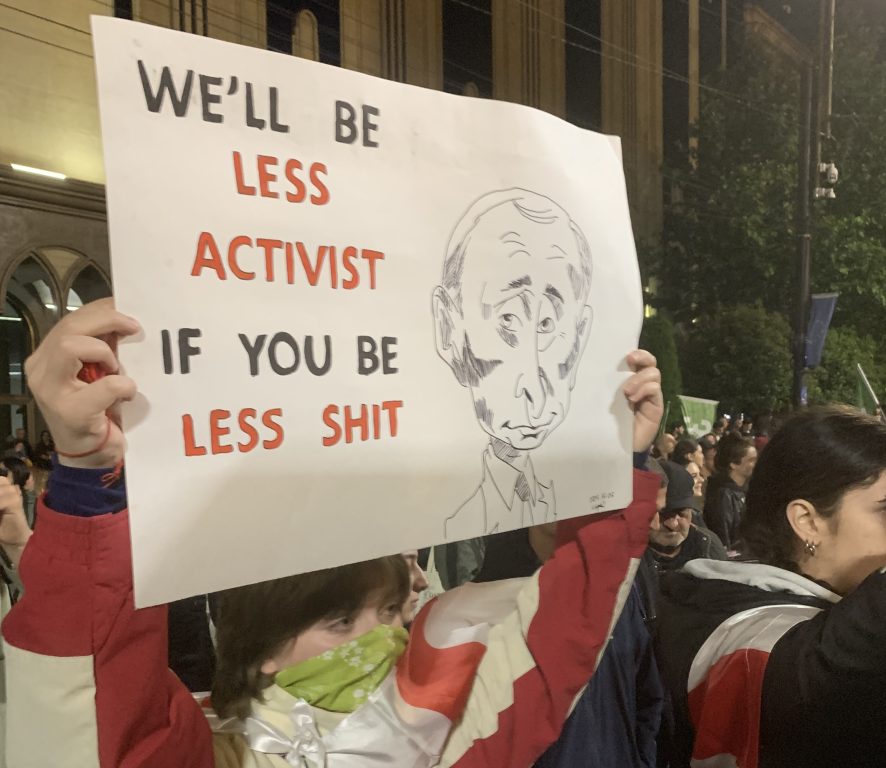
‘They threatened my young daughter’
Ruling party leaders have made clear in public statements that they intend the new NGO law to be used against groups and media that criticise the government or, in a clear appeal to conservative Georgians, advocate for lesbian, gay, bisexual, and transgender (LGBT+) rights.
Prime Minister Irakli Kobakhidze has justified the need for the bill by pointing to initiatives that criticise the authorities or challenge government policies, claiming that some civic groups tried to “organise a revolution” in 2020 and 2022, “engage in LGBT+ propaganda”, and “discredit the police, judiciary, and the Georgian Orthodox Church”.
However, on May 17, at a major rally of conservative Georgians in central Tbilisi (part of a national ‘family purity’ day), some church leaders used carefully worded statements to suggest that ‘the Russian law’ may not be entirely in the country’s best interests.
Meanwhile, prominent protesters and members of NGOs have received vaguely menacing phone calls—as have their families. “They called my nine-year-old daughter,” one activist told me. At times, government tactics have been simply brutal. On May 14, David Katsarava, an opposition leader, was severely beaten by police and remains in hospital.
Late on May 18, Georgia’s president, Salome Zourabichvili, once supported by Georgian Dream but long since in open opposition to the government, vetoed the new law. The government’s parliamentary majority, however, is more than large enough to override the veto.
Zourabichvili had been expected to wait for the opinion of the Council of Europe’s Venice Commission (likely to be made public this week) before making her decision. The speed of the veto however, and her accompanying declaration that the law is, in its entirety, incompatible with Georgia’s constitution and European path, backs the government into a corner.
Had Zourabichvili opposed only some parts of law there had been suggestions that Georgian Dream could have used the veto to make cosmetic changes in order to present a mirage of compromise. The veto of the entire bill means that Georgian Dream will now be forced to adopt it as is—at a stroke making Georgia’s government a pariah in just about every European capital—or pull it. The veto will also likely provide new impetus for the protests.
Europe’s muted reaction
In the European Parliament, MEPs representing the EPP, S&D, Greens and Renew have written to foreign affairs chief Josep Borrell urging him to prepare “targeted” sanctions against the Georgian Dream politicians who pushed through the foreign agents law—including Prime Minister Irakli Kobakhidze—and the MPs who voted for it.
It has also been reported that a decision by the bloc to start accession talks was likely to be indefinitely postponed if the law came into force. The EU might also suspend Georgia’s visa-free travel deal. “This would punish us—it’s personal sanctions that are needed, and needed now,” a young protester told me.
Borrell, and Commissioner for Neighbourhood and Enlargement Olivér Várhelyi issued a joint personal statement on May 15, saying that they believe the adoption of the law negatively impacts Georgia’s progress on its EU path.
“The choice on the way forward is in Georgia’s hands,” they said. Protesters in Tbilisi were later angered by Charles Michel, EU Council president, saying that he had told Zourabichvili in a phone call that he would help to find, “the best way to address legitimate concerns of all sides”.
“Exactly what ‘legitimate concern’ could a Russian regime in Georgia have?”, asks Mikiashvili. “Do [President of Belarus Aleksander] Lukashenko and [former Ukrainian President Viktor] Yanukovych have ‘legitimate concerns’ too?”
Institutionally, however, the EU has been silent, with a statement condemning the law reportedly being blocked by Hungary. The reaction from the US has been far louder. Assistant Secretary of State Jim O’Brien, who visited Tbilisi last week, called the law a potential “turning point”, and warned Kobakhidze that his government would lose hundreds of millions of US dollars in military and economic aid if it became an “adversary and not a partner”.
There was also a very public show of support from the foreign ministers of the three Baltic states and Iceland on May 15, who travelled to Tbilisi to meet with President Zourabichvili and several key NGOs.
“This law can’t be fixed, because it is fundamentally broken,” said Gabrielius Landsbergis, Lithuania’s foreign minister. “If enacted, the law will likely evolve, as we saw in Russia. Once the law exists it is easy to amend it quietly. The very logic of the law is a slippery slope which could lead to total control of the civic space.” He later addressed protesters in front of Georgia’s parliament, along with Estonian FM Margus Tsahkna and their Icelandic counterpart Thórdís Kolbrún.
The speaker of Georgia’s parliament, Shalva Papuashvili, said that the three ministers addressing what he called “a radical anti-government rally” was “an unfriendly act against the Georgian people”. The thousands of Georgians who sang Ode to Joy along with their visitors would disagree.
The end game
Georgia is set to hold a parliamentary election in October, but Marika Mikiashvili believes that one way or another, the current crisis could have its denouement far earlier. Much like those protesting, she feels it could be a case of back down or crack down.
“Georgian Dream expects the protests to end, but they won’t,” she says. “There is real momentum now. The protests will go on, the road blockages will go on, the strikes will go on. And at some point, the government will have to react.”
There were signs on May 17 that the Georgian opposition—increasingly united against Georgian Dream despite clear policy differences—was ready to put all its efforts into presenting a unified, coherent alternative at October’s election. President Zourabichvili—spotted attending a protest last week incognito, with no security detail—would likely be an unofficial figurehead for such a movement.
The stumbling block is ensuring that the elections honour the rules of fair play. Recent Georgian elections have been declared by independent observers as “free, but not fair”—primarily because of Georgian Dream’s almost total stranglehold over broadcast media and state capture of public institutions. CEPA’s Ketevan Chachava has encouraging news, however.
“Georgian voters are increasingly smart. They have become very good at identifying propaganda and misinformation.”
Nevertheless, just as they are needed the most, the NGOs that try to ensure as fair a playing field as possible are about to be hamstrung. The protests will therefore continue.
“My father is 79 and he just received a new passport,” one Georgian told me. “He asked me if he could still hope to one day get an EU passport.”
On the streets of Tbilisi, Georgia’s young people are doing all they can to make that old man’s dream happen.
